World Social Forum 2016: Let’s Talk About Food Sovereignty - Discussion workshop on 12th August
Food Secure Canada invites you to join us at the table for the 2016 World Social Forum in Montreal.
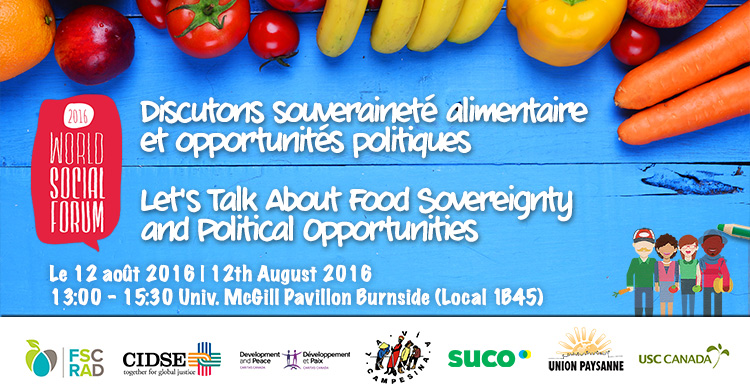
As a pan-Canadian alliance of organizations and individuals working together to advance food security and sovereignty, we invite the public and experts to gather for a grand banquet of ideas at World Social Forum 2016 on 12th August 2016.
We all have a role to play in the way we consume and produce our food. Whether you are a consumer at the end of the chain or you cultivate the resources that sustain us, building healthier, more just and sustainable food systems begins with sharing our visions.
Food sovereignty is an internationally recognized principle, wherein food constitutes a fundamental pillar of the health and vitality of individuals, communities, economies, and ecosystems.
Together, we will define the pillars of food sovereignty, along with speakers invited for the occasion. Participants will form discussion groups around themes in which they are interested. Throughout these discussions, we will identify policy solutions to promote food sovereignty.
Discussion workshop with round tables :
Speakers
 |
Diana Bronson Food Secure Canada - Executive Director. |
 |
Eric Darier Greenpeace International - Senior Campaigner on Ecological Agriculture. |
 |
François Delvaux CIDSE - Policy and Advocacy Officer (Food, Agriculture and Sustainable Trade). |
 |
Mamadou Goita Institut de recherche et de promotion des alternatives de développement en Afrique (IRPAD/Afrique) - Executive Director. |
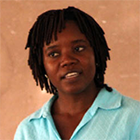 |
Magorie St-Fleur Mouvement paysan Papaye Haïti - Agronomist |
Activity co-organised by :
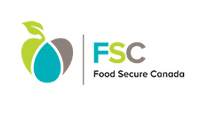
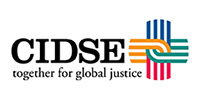

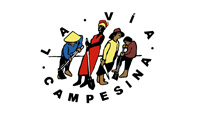
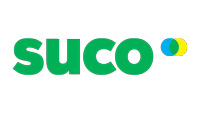
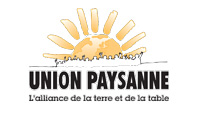
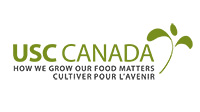
Find us on Facebook and invite your friends:
We invite you for a grand banquet of ideas during our discussion workshop at World Social Forum (Montreal) on 12th...
Posted by Food Secure Canada on Wednesday, July 20, 2016
Food sovereignty at the centre of the debate
“Food sovereignty is the right of peoples to healthy and culturally appropriate food produced through ecologically sound and sustainable methods, and their right to define their own food and agriculture systems.” La Via Campesina
Food sovereignty is an internationally recognized principle, wherein food constitutes a fundamental pillar of the health and vitality of individuals, communities, economies, and ecosystems.
Key elements in food sovereignty include:
- Ensuring that food is eaten as close as possible to where it is produced (domestic/regional purchasing policies for institutions and large food retailers, community-supported agriculture, local farmers markets, etc.).
- Supporting food providers in a widespread shift to ecological production in both urban and rural settings (organic agriculture, community-managed fisheries, indigenous food systems, etc.), including policies for the entry of new farmers into agriculture.
- Enacting a strong federal poverty elimination and prevention program, with measurable targets and timelines, to ensure Canadians can better afford healthy food.
- Creating a nationally-funded Children and Food strategy (including school meal programs, school gardens, and food literacy programs) to ensure that all children at all times have access to the food required for healthy lives.
- Ensuring that the public, especially the most marginalized, are actively involved in decisions that affect the food system.
A People’s Food Policy For Canada, FSC’s policy discussion paper, offers a detailed report of what food sovereignty could mean for Canada. It took nearly three years and 3,500 people to produce.
Seven Pillars of Food Sovereignty
The first six pillars were developed at the International Forum for Food Sovereignty in Nyéléni, Mali, in 2007. The seventh pillar – Food is Sacred - was added by members of the Indigenous Circle during the People’s Food Policy process.
1. Focuses on Food for People
- Puts people’s need for food at the centre of policies
- Insists that food is more than just a commodity
2. Builds Knowledge and Skills
- Builds on traditional knowledge
- Uses research to support and pass this knowledge to future generations
- Rejects technologies that undermine or contaminate local food systems
3. Works with Nature
- Optimizes the contributions of ecosystems
- Improves resilience
4. Values Food Providers
- Supports sustainable livelihoods
- Respects the work of all food providers
5. Localizes Food Systems
- Reduces distance between food providers and consumers
- Rejects dumping and inappropriate food aid
- Resists dependency on remote and unaccountable corporations
6. Puts Control Locally
- Places control in the hands of local food providers
- Recognizes the need to inhabit and to share territories
- Rejects the privatization of natural resources
7. Food is Sacred
- Recognizes that food is a gift of life, and not to be squandered
- Asserts that food cannot be commodified
- Log in to post comments

